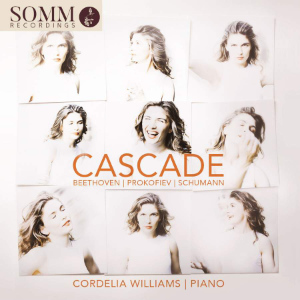
Cascade
Ludwig van Beethoven (1770-1827)
Bagatelle in C major, WoO 56 (1804)
Sergei Prokofiev (1891-1953)
Visions fugitives, Op. 22 (1915-17)
Robert Schumann (1810-1856)
Waldszenen, Op. 82 (1849)
Ludwig van Beethoven
Six bagatelles, Op. 126 (publ. 1825)
Cordelia Williams (piano)
rec. 2023, Turner Sims, Southampton, UK
Reviewed as a 96/24 WAV download
SOMM Recordings SOMMCD0675 [65]
In her preface to this recording, Cordelia Williams tells us that its title comes from Rilke’s Book of Hours, and that “the music recorded here gives us micro-glimpses into countless worlds – inner worlds, literal worlds, dissolving worlds, worlds of imagination – each world contained within a fragmentary passing moment.”
Cordelia Williams has already recorded Nightlight on the SOMM label (review), as well as Schubert, Schumann, and a disc which has a musical meeting between J.S. Bach and Arvo Pärt, all of which are worth acquiring. As ever in Cascade, Williams’ effortlessly beguiling technique and natural sense of musicality makes this the kind of disc that you can put on and lie back in a bath of aromatic suds, assured that you are in safe hands. This also goes for the carefully considered programme which, while it has its brief moments of ‘storm and stress’, is by no means likely to shock anyone’s candle-lit reverie. The beautiful sound quality from a well-tuned Steinway ‘D’ instrument helps in this as well of course.
The word ‘fragmentary’ has been mentioned, but there is a flow here that removes a sense of this programme being ‘fragmented’. These tracks are indeed mostly around the two-minute mark when it comes to duration, with the final Presto of Beethoven’s Op. 126 being the longest at just over four minutes. There is however a quality to most of these pieces that indeed makes them worlds unto themselves, and Cordelia Williams gives just the right amount of weight to the serious works, with lightness or wit often part of the more throwaway statements. The characterisation of each composer’s music is another essential aspect of this recital. Beethoven sounds like Beethoven should; ecstatic and at ease with life one moment, gruff and frustrated the next. Prokofiev’s subtle magic and Schumann’s quixotic edginess are all conjured and superbly defined, and as a recital this is the kind of recording that will reward with new discoveries each time.
You won’t often find a meeting of Beethoven, Schumann and Prokofiev on a single piano disc. Nikita Mndoyants does have a recording with these composers on the Steinway & Sons label, but this shares only the Six Bagatelles Op. 126 when it comes to the programme. When it comes to individual pieces there are of course comparisons to be made, but with such a beautiful recital as this I am reluctant to point out more than a few.
I still very much admire Anna Gourari’s ECM recording of Prokofiev’s Visions fugitives (review) which, surrounded in that acoustic aura often preferred with this label has an added sense of profundity when put alongside Cordelia Williams. The Andante second movement is somewhat symbolic of this approach, coming in at 1:45 to Williams’ by no means superficial 1:27. Gourari’s timing as a whole is however only about two minutes longer than Williams’, so perception and reality are perhaps not so far apart after all. If I want Schumann’s Waldszenen then there are innumerable choices, with Claudio Arrau on Philips/Decca always a safe bet. Dejan Lazić on Channel Classics (review) has long fallen by the wayside, and these days I might go more for Marc-André Hamelin on Hyperion (review). Cordelia Williams wins us over with elegance of phrasing and lyrical expressiveness, delivering plenty of contrast between the reflectively introvert and busy or heroic extrovert observations in Schumann’s woodland scenes, and perhaps his divided personalities. Contrast is certainly an aspect of Beethoven’s Bagatelles, and the enigmatic modernity of the opening C major piece is a marvellous book-end to the set of Six Bagatelles Op. 126 with which the recital closes, and a perfect segue into the Prokofiev. Williams’ sense of inner contrast with these deceptive pieces is acute, and her firm/lightness of touch immediately brings us into the Beethoven pianistic idiom. We are again spoilt for choice with these pieces, though I suspect I last encountered them on a recording back in 2017 with Gabriele Baldocci on the Dynamic label (review). Williams has Beethoven’s measure when it comes to his wilful freedom of expression in these pieces, which seem to dart between the ancestry of C.P.E. Bach and ambitious forays towards something like the Ninth Symphony.
Earlier I suggested that this recording might be a satisfying accompaniment to a nice soak in a hot bath, and I stand by this comment. As with any good recording of a fine set of performances you can and should however get out your aural close-up lenses, and Cordelia Williams’ playing can very much stand up to detailed scrutiny in just about every nook and corner of this fine recital. It might have been nice to have something by a living composer included, but that’s just the way things roll sometimes.
Dominy Clements
Help us financially by purchasing from




















